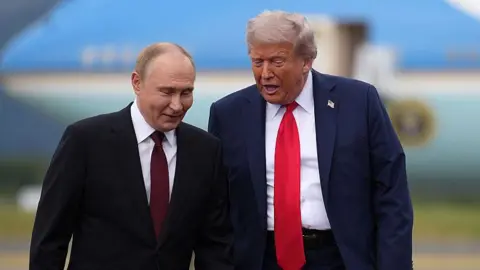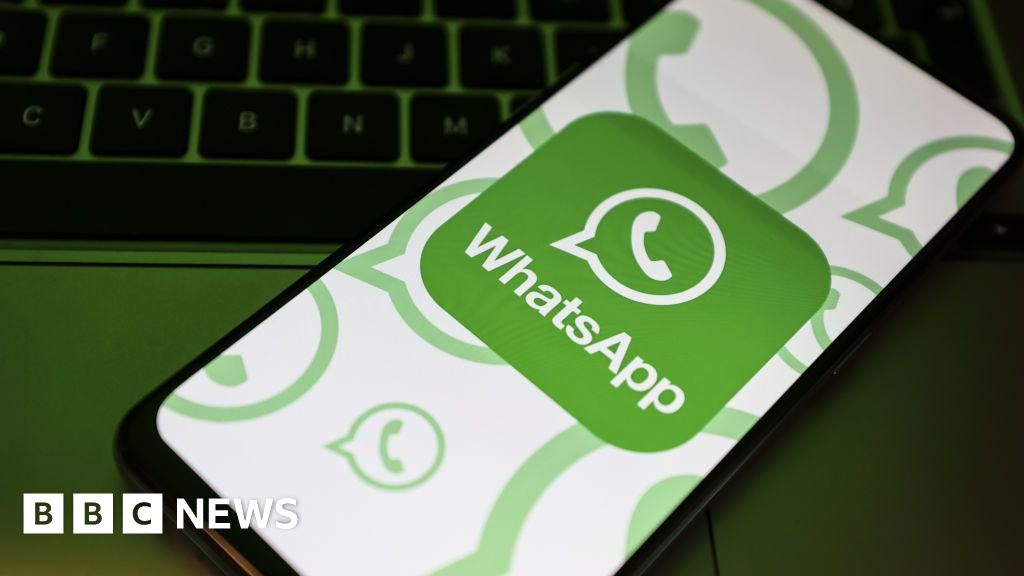BBC News
 Getty Images
Getty ImagesThe Kremlin has played down talk of an imminent summit between Russian President Vladimir Putin and Ukraine’s Volodymyr Zelensky, as Donald Trump renewed his call for the two leaders to meet to discuss ending the war in Ukraine.
The push for a bilateral meeting comes after the US president met Putin in Alaska last week, and welcomed seven European leaders and Zelensky to the White House on Monday.
Trump admitted the conflict was “a tough one” to solve and conceded it was possible the Russian president was not interested in ending hostilities.
“We’re going to find out about President Putin in the next couple of weeks,” he said on Tuesday. “It’s possible that he doesn’t want to make a deal.”
Putin faced a “rough situation” if that were the case, Trump added, without offering any details.
The Russian president on Monday told Trump he was “open” to the idea of direct talks with Ukraine, but the next day Foreign Minister Sergei Lavrov watered down that already vague commitment.
Any meeting would have to be prepared “gradually… starting with the expert level and thereafter going through all the required steps”, he said, repeating a frequent Kremlin line.
Dmitry Polyanskiy, a Russian deputy representative to the UN, told the BBC “nobody [had] rejected” the opportunity for direct talks, “but it shouldn’t be a meeting for the sake of a meeting”.
On Tuesday, it was reported that Putin had suggested to Trump that Zelensky could travel to Moscow for talks, something Ukraine was never likely to accept.
The proposal may have been Russia’s way of putting forward an option so far-fetched Kyiv could not possibly have agreed to it.
Talks over the last few days appear to have given Trump a renewed understanding of the complexities of the war and the gulf between Moscow’s demands and Kyiv’s position.
The much-vaunted ceasefire he said he could get Putin to agree to has not materialised – and now the US president has said Ukraine and Russia should move directly to a permanent peace deal instead – but some headway was made in terms of security guarantees for Ukraine.
Zelensky and European leaders seem to have convinced Trump that such commitments would be paramount to Kyiv’s sovereignty in the event of a peace deal.
On Tuesday, Trump said the US was willing to help the Europeans “by air” if they provided boots on the ground in Ukraine in the event of a ceasefire or peace deal, although he ruled out deploying US troops.
The US president, however, did not go into the specifics of whether such air support may entail intelligence or the use of fighter jets and war planes.
While Trump’s commitments remain vague, the France and UK-led Coalition of the Willing said it had been working to firm up plans for a reassurance force that could be sent to Ukraine if the hostilities end.
After a virtual meeting of the group on Tuesday, a Downing Street spokesperson said the group would meet US counterparts in the coming days to “further strengthen plans to deliver robust security guarantees”.
 Getty Images
Getty ImagesFollowing his summit with Putin and latest talks with Zelensky, Trump now appears to think direct talks between Ukraine and Russia could bring a peace deal closer – although he acknowledged there had been “tremendous bad blood” between the two leaders.
The last time they met was in 2019. Since then, Moscow’s war on Kyiv has resulted in tens of thousands of casualties as well as widespread destruction and ongoing aerial attacks on civilian targets.
Putin considers Zelensky illegitimate and views him as responsible for Ukraine’s growing proximity to the West. For years now, he has made baseless claims about Kyiv being ruled by a “neo-Nazi regime” and has said any ceasefire with Ukraine would need to entail a change in Kyiv’s leadership.
Russia also has little interest in agreeing to talks while its troops have the upper hand on the front line.
Still, European leaders and Zelensky have spoken out in favour of the idea of a bilateral meeting. The Ukrainian president said on Monday he was open to “any format” of meeting Putin, while the Europeans have been putting forward ideas for potential summit locations.
By enthusiastically supporting direct talks, they are likely hoping to convince Trump to revert to a tougher stance against Moscow should Putin remain unwilling to take steps to end the war.
Meanwhile, Ukraine’s European partners appear significantly less optimistic than Trump that a resolution of the conflict could be within reach.
On Tuesday, French President Emmanuel Macron called Putin “a predator, and an ogre at our doorstep” and expressed “the greatest doubt” that the Russian president was willing to work towards peace.
Finnish President Alexander Stubb said Putin was “rarely to be trusted”, adding he was sceptical about a meeting with Zelensky materialising.
More high-level talks are planned for the coming days as questions over Trump’s level of support for Europe remain.
Britain’s military chief, Admiral Tony Radakin, is travelling to Washington for discussions on the deployment of a reassurance force in Ukraine, while Nato military chiefs are expected to hold a virtual meeting on Wednesday.




